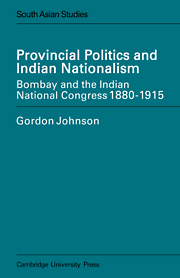Book contents
- Frontmatter
- Contents
- List of plates
- Acknowledgements
- Dedication
- Abbreviations
- Introduction
- 1 The Indian National Congress
- 2 The politics of western India in the later nineteenth century
- 3 Tilak, Gokhale and the Indian National Congress, 1895 to 1906
- 4 Tilak, Gokhale and the Indian National Congress, 1907 to 1915
- A perspective
- Note on sources
- Index
- Plate section
2 - The politics of western India in the later nineteenth century
Published online by Cambridge University Press: 24 November 2009
- Frontmatter
- Contents
- List of plates
- Acknowledgements
- Dedication
- Abbreviations
- Introduction
- 1 The Indian National Congress
- 2 The politics of western India in the later nineteenth century
- 3 Tilak, Gokhale and the Indian National Congress, 1895 to 1906
- 4 Tilak, Gokhale and the Indian National Congress, 1907 to 1915
- A perspective
- Note on sources
- Index
- Plate section
Summary
In the later nineteenth century, Poona, the former capital of the Mahratta empire, established for itself a reputation for liveliness in public affairs. Men from that city exercised a disproportionate share of influence in the politics, education, social reform, journalism and literature of western India, and many Poona leaders achieved recognition throughout the subcontinent. Although reduced since the defeat of the Peshwa to being a mere divisional headquarters in the Bombay Presidency, Poona's influence continued to flow beyond the formal administrative boundaries of that Presidency into Berar and into parts of the Central Provinces and Hyderabad. To all those who spoke Marathi it remained ‘the hub of Maharashtra’ and with the revival of Maharashtrian aspirations it was to Poona that the inhabitants of the Deccan looked for a lead.
Poona politicians were among the first to set themselves up as spokesmen for India, and like leaders in the other seaboard presidencies they were among the first to found modern political associations and to consider carrying their campaign to the all-India level. But from the time of the first embassies to the court of the Peshwa, the British realised that in Poona they were dealing with proud men, past masters at the art of intrigue, and puffed up with political ambition. The Bengali, even when he turned to throwing bombs, might be dismissed as a simple baboo ‘full of inappropriate words and phrases’ but so harmless an epithet was never applied to Maharashtrians.
- Type
- Chapter
- Information
- Provincial Politics and Indian NationalismBombay and the Indian National Congress 1880-1915, pp. 53 - 117Publisher: Cambridge University PressPrint publication year: 1974

